Communication needs and the Australian gambling field
Summary findings from consultations conducted by the Australian Gambling Research Centre
You are in an archived section of the AIFS website
Introduction
Effective frameworks for communication can bridge gaps between research, clinical practice, and policy. The gambling sector in Australia comprises a number of stakeholder groups with diverse interests, objectives, and professional skills and resources. The diversity of the sector can present challenges in developing communication strategies that are accessible, and adequately meet the needs of the audience. This report provides insight into ways in which these challenges may be addressed.
In 2013-14 the Australian Gambling Research Centre (AGRC) interviewed and surveyed government officials, service providers, researchers, and community and industry representatives involved in the gambling sector to identify their principal information and resource needs. The findings informed the development of the AGRC's research communication plan.
The key findings are:
- professionals often find it difficult to access important resources;
- summaries and key messages of longer documents are valued for their time efficiency;
- simple, cost-effective electronic dissemination methods increase accessibility; and
- active exchange of resources and knowledge between professionals is valued.
To maintain and improve the professionalism available across the field of gambling in Australia, organisations must ensure good accessibility to information and resources. Organisations may use the findings of this summary to inform practices around information and resource access, and communication practices that are suitable to their audiences.
Consultative process
The consultative process took place with key stakeholders, including:
- researchers from diverse disciplines;
- practitioners and service providers;
- policy makers and regulators; and
- industry representatives.
The study comprised an online survey and individual interviews. This report draws primarily from the findings of the survey. Insights from the interviews provided context and depth to the interpretation of the statistical findings.
Online survey
Professionals working in gambling-related fields across Australia were invited to complete an online survey. We received 174 responses. The survey asked about access to resources that professionals considered important to their work, and opportunities for exchange of information and resources. Organisations and individuals in the gambling and allied fields were identified through professional networks. Experts in evaluation and knowledge translation and exchange at the Australian Institute of Family Studies provided input into the development of the questions.
All states and territories, and each of the stakeholder groups, were represented in the survey. There was a strong representation from service providers in the survey responses, reflecting that they account for a large proportion of the employee workforce in the gambling field across Australia.
The survey participants were asked to rate the importance and difficulty of access of the following types of information resources:
- de-identified datasets for secondary data analysis (e.g., from research projects, problem-gambler treatment-seeker information, venue player information);
- updates on responsible gambling activities of venues;
- brief summaries of and links to government reports;
- brief summaries of and links to legislation and discussion papers;
- call-outs for participation in research projects;
- brief summaries of and links to peer-reviewed papers;
- information about upcoming gambling conferences, seminars and webinars;
- resource materials (e.g., posters, booklets, DVDs) developed by problem gambling counselling services and other organisations;
- gambling industry codes of conduct; and
- information about upcoming events (e.g. Responsible Gambling Awareness Week).
Resources that were rated by a majority of participants as being quite/very important and fairly/very difficult to access are the focus of this report.
Face-to-face and telephone consultations
The AGRC also held interviews with 21 high-level representatives of stakeholder sectors in the gambling field across Australia. The consultations were conducted face-to-face or over the telephone.
Communications needs
Challenges across the gambling field
Easy access to information and resources is essential for any professional. This section outlines those resources that were identified by professionals in the gambling field as being important but difficult to access. Findings are presented in relation to participants as a whole, and for each stakeholder group. The data illustrated in Figures 1-5 are also presented in detail in Tables A1 and A2 of the Appendix.
Professionals reported difficulty in accessing information relevant to their work. Information and resources that were rated by professionals in the gambling field as both important and difficult to access were:
- summaries of and links to government reports, peer-reviewed papers, legislation and discussion papers;
- de-identified datasets for secondary data analysis; and
- updates on responsible gambling activities of venues (Figure 1).
Figure 1: Proportion of participants who rated gambling resources as important, against the proportions who rated resources as being difficult to access
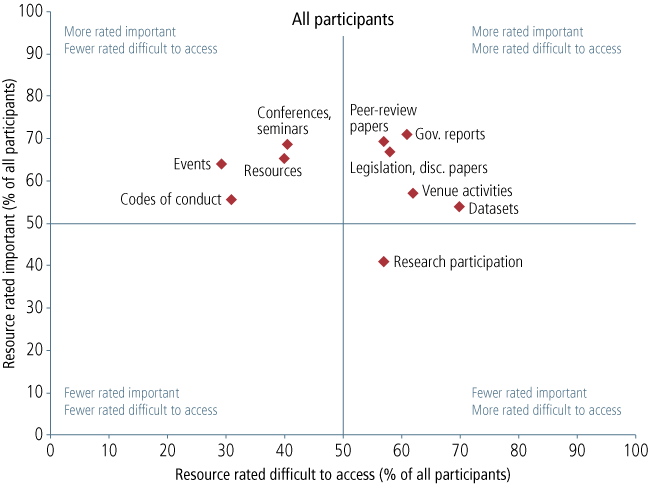
Most survey respondents rated government documents, including research reports, legislation and discussion papers, as both important and difficult to access (see Box 1). When interviewed, professionals suggested that summaries of these documents be made available through electronic platforms (e.g., e-newsletters, websites). Respondents from all sectors also suggested that brief fact sheets and discussion papers are useful sources of information because they can provide succinct, valuable, up-to-date information for time-poor professionals. Further, summary documents, including systematic and meta-analytic reviews, can hold research studies to a high standard of integrity and rigor, and can highlight findings that should be given more weight when informing decision-making. One participant noted, "not all studies are equal", and emphasised the value of discussion papers written by researchers expert in the topic area to inform effective policy and interventions.
Box 1: The big picture: Synthesis and critical analysis
Policy makers and regulators expressed interest in documents that offer syntheses and critical analyses of gambling literature to help with their decision-making around policy and regulations.
While physical access to documents and other resources is important, accessibility can also relate to the usefulness of the information, and how easily it is understood. Large and complex reports can be quite inaccessible in a time-poor environment. Similarly, a large body of evidence located across numerous, academic articles and reports can be difficult to access and absorb. Documents that synthesise and critically review a body of evidence can bring together the findings of a wide range of literature, providing clarity around current evidence as well as big-picture insights. Reporting that examines the quality of the research and weighs evidence accordingly helps to provide context and perspective for decision-makers. Importantly, it can also help to inform directions for future investigation and intervention (Gopalakrishnan & Ganeshkumar, 2013; Mulrow, 1994).
The presentation of such information requires careful consideration. While text-based documents are useful for communicating complex ideas and issues, more concise forms, such as fact sheets and infographics, can very succinctly communicate the "take-home" messages from reviews. These forms are efficient for time-poor professionals, easy to understand, and more easily exchanged between colleagues and the public.
De-identified datasets were also recognised as being both important and difficult to access for all sectors. Datasets with information about gambling can be used to explore a range of questions, including beyond the main purpose of the data collection. A wealth of information resides in the numerous sets of data collected for research, regulation, and other purposes. Often, a relatively small portion of data collected for a project is analysed. The availability of datasets for secondary analysis would make the most of the effort and expense of primary data collection. This would also be an efficient approach to research, as it does not have the financial and time expenses associated with primary data collection.
While further consultation is required to clarify the data that are of most interest to professionals, interest in player data was highlighted in the consultations and open-ended survey responses. In consultations, participants expressed interest in a "data warehouse", comprising, for example, de-identified data about gambling behaviour for each product at each venue and for each player across all states and territories.
Challenges for each sector
We further examined the information and resource needs of each sector to provide insight into their individual needs, and the audiences for different types of resources. Each sector reported difficulty in accessing resources that were directly relevant to their work. Care should be taken in the interpretation of results for particular sectors due to the very small numbers in some groups (see the Appendix for detailed reporting of response rates).
Researchers
Researchers reported experiencing difficulty accessing the following important resources:
- de-identified datasets for secondary analysis;
- call-outs for participation in research projects; and
- summaries of and links to government reports, legislation and discussion papers (Figure 2).
Overall, researchers reported having reasonable access to most resources they require for their work, including peer-reviewed articles and information about conferences, webinars and seminars. These are resources that are likely to be available to researchers via their university infrastructure, their networks, and newsletter subscriptions.
Figure 2: Proportion of researchers who rated gambling resources as important, against the proportions who rated resources as being difficult to access
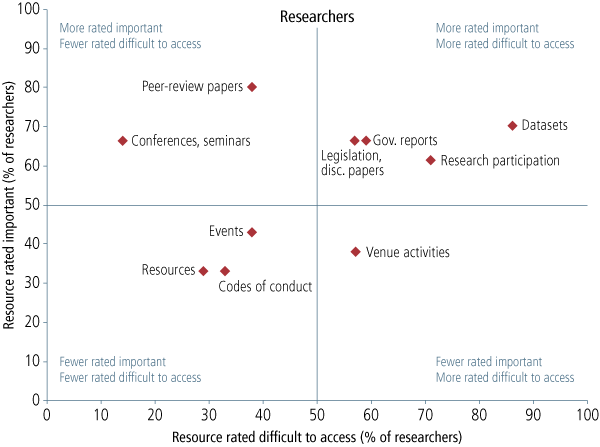
Researchers reported difficulty with attaining primary and secondary data, either in terms of accessing secondary datasets or promoting their studies to potential participants. These challenges limit the data that researchers have to work with, and the quality of the information available to gambling sector professionals. Additionally, these challenges suggest inefficiencies in data collection and management. As discussed above, analysis of secondary datasets offers opportunities to reveal a wealth of information from existing data, which is more cost- and time-efficient in comparison to the collection and analysis of primary data.
Also identified as important but difficult to access were summaries of government documents, and electronic links to documents in general, which enhance the immediacy of document retrieval. This may suggest a need for changes to the current methods of disseminating government documents in full or as summaries. Electronic newsletters and user-friendly websites that provide summaries and links to documents would support researchers' information needs.
In the consultations and open-ended responses, researchers also expressed interest in player information from gaming products. This information was considered less important than others in survey responses; however, it is possible that better access could ignite interest among researchers, and improve the empirical investigation of gambling through the use of real-time and in-venue/website data.
Policy makers and regulators
Policy makers and regulators reported difficulty accessing important resources including:
- summaries of and links to government reports and peer-reviewed papers;
- updates on responsible gambling activities of venues; and
- de-identified datasets for secondary data analysis (see Figure 3).
Figure 3: Proportion of policy makers and regulators who rated gambling resources as important, against the proportions who rated resources as being difficult to access
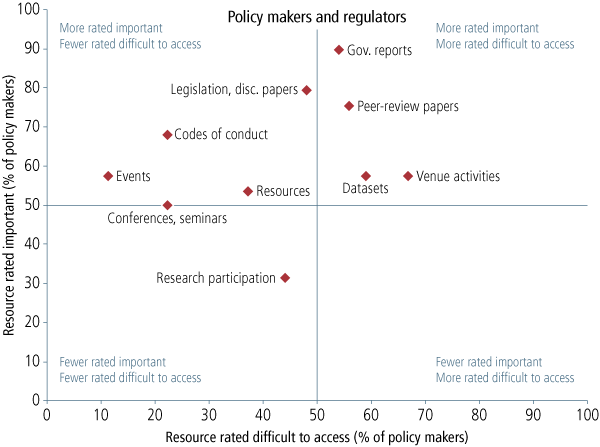
Policy makers and regulators, as well as all other professionals, reported poor accessibility to government reports on gambling, either as full documents or summaries. A substantial proportion of gambling research conducted in Australia is funded and coordinated by governments at the state and territory level. This research also tends to be policy-relevant research.
The finding that policy makers and regulators are experiencing difficulties accessing government documents suggests that additional communication methods are required. These documents (as full-text documents or links) could be disseminated through popular electronic media, and could be stored in online libraries with user-friendly file retrieval systems. Accessibility and relevance can be further enhanced by key findings being communicated through short summaries of the reports. Improved access to these reports is essential to ensure that policy-relevant and novel evidence is accessible to inform decision-making, as well as to advance knowledge in the field.
Practitioners
Practitioners reported having difficulty accessing most resources that they considered important (see Figure 4). This included:
- summaries of and links to peer-reviewed papers, government reports, legislation and discussion papers;
- updates on responsible gambling activities of venues;
- information about upcoming gambling conferences, seminars and webinars; and
- de-identified datasets for secondary data analysis.
Figure 4: Proportion of practitioners who rated gambling resources as important, against the proportions who rated resources as being difficult to access
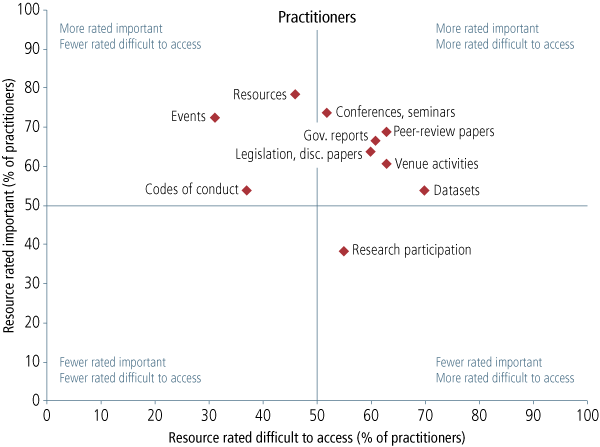
Practitioners' poor access to information resources, such as government and academic research, government documents and relevant conferences, challenges their ability to remain current with general gambling knowledge, therapies and public health interventions. This affects their professional development and ability to administer effective community education programs.
Industry representatives
Industry representatives reported having difficulty accessing the following resources that they considered important:
- summaries of and links to legislation and discussion papers;
- call-outs for participation in research projects;
- summaries of and links to government reports; and
- de-identified datasets for secondary analysis (see Figure 5).
Industry representatives indicated that they have good access to information and training resources required to meet regulations for the responsible provision of gambling products. They also demonstrated an interest in emergent research evidence and regulations, which is a positive sign for the advancement of consumer protection. However, their limited access to legislation and discussion papers, and/or useful summaries of government reports, is a challenge that will potentially affect their responsible service of gambling and harm-minimisation interventions.
Figure 5: Proportion of industry representatives who rated gambling resources as important, against the proportions who rated resources as being difficult to access
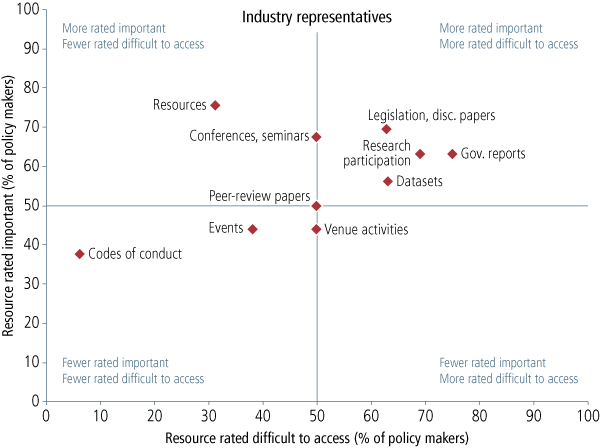
Communications framework
Taken together, the findings indicate that there are opportunities for improved communications activities in three domains: "Receive" (through dissemination), "Retrieve" (stored resources), and "Engage" (by active exchange) (see Figure 6). This is discussed below with reference to professionals' preferences for different modes of communication. Findings are detailed in Figure A1 in the Appendix.
Figure 6: Information and resource challenges of professionals in the gambling field, across three communication domains
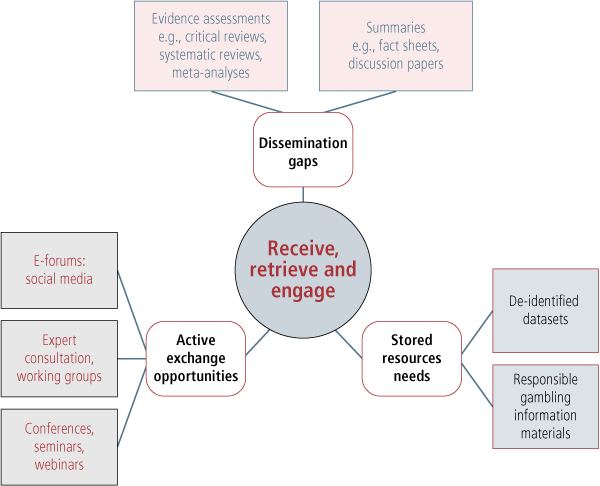
Receive
Professionals require improved dissemination of contemporary materials. They wanted to receive information such as new reports, summaries of research (e.g., fact sheets, discussion papers), and evidence assessments (e.g., critical reviews, systematic reviews, meta-analyses). Online forms of dissemination are well designed for notifications of contemporary materials, particularly where they include active links for accessing the full information.
Email newsletters were the primary communication preference for all sectors. This preference is likely to reflect a level of comfort around emails as an established and trusted communication platform. Receiving alerts of webpage updates (e.g., through RSS feeds) was also relatively popular. By comparison, newer platforms such as social media (e.g., Twitter, Facebook) were less popular, even though they are efficient means of immediately receiving and sharing current updates and ideas. Greater familiarity with different media/communication modalities in coming years may increase their usage in the field.
It should be noted, however, that the Receive domain requires considerable resources from the producer/sender to push out information to their audience on a regular basis in an attractive and accessible format.
Retrieve
Almost three-quarters of professionals reported a preference for finding information by visiting websites. Stored resources are those that remain contemporary for extended periods and are periodically accessed (e.g., legislation, industry codes of practice, venue worker training materials). These materials could be made accessible via a website or digital library. Their accessibility is reliant on updating them regularly to keep resources contemporary, incorporating an intuitive website navigation design, and providing an effective keyword search tool.
Engage
Almost all professionals indicated an interest in having opportunities to actively exchange knowledge and resources with other professionals in the gambling and allied fields (see Box 2).
Box 2: Active exchange of knowledge and resources
Traditionally, information and dissemination methods follow a one-way trajectory to a large and diverse audience, who passively receive the information (Daly & Haney, 2014; Hinton, Gannaway, Berry, & Moore, 2011). Survey participants indicated a strong interest in exchanging information and resources with other professionals across sector and state/territory divides. Active, two-way exchanges between professionals and organisations can increase efficiency in information and resource development, and can encourage collaboration and innovation across sector and geographic divides.
Platforms that encourage active networking and information exchange, such as conferences, seminars and webinars were considered by all sectors to be useful in their work. Approximately three-quarters of participants were also interested in the exchange of advice and expertise to support their work. This suggests a strong interest in learning from, and communicating with, other professionals.
Internet platforms such as Facebook, Twitter and Skype, and websites such as The Conversation, can facilitate active exchanges of information on a more regular basis, as they easily cross geographic boundaries and are relatively cost-effective and accessible. Through these media, professionals can share a wide range of information and resources using text, images, video and other resources. These exchanges can take place in real time, or through posts that can be read at any time. Externally moderated platforms can provide opportunities for greater innovation and more open exchanges. The quality of exchanges is reliant on the active and dedicated participation of a range of professionals and organisations in the gambling and allied fields.
Exchange opportunities can be created through forums such as conferences, seminars, webinars and working groups, as well as social media platforms. Emergent interactive social media such as Facebook and Twitter were less popular among professionals. This may reflect a lack of knowledge of the flexibility and potential of these new communication methods, which are a natural fit for active engagement between individuals and groups who may be professionally or geographically dispersed. These methods may gain in popularity through more widespread adoption in the coming years.
Communicating beyond the gambling sectors
Allied health and social services screening and referral
Professionals in allied health and social services were also flagged as a target audience for gambling-related information. Participants commented that allied professionals with whom they have worked often lack understanding of gambling problems, and the relationship between gambling issues and a range of other health and social problems. Policy makers also noted that many people experiencing gambling problems seek help for medical problems or social services issues, but avoid seeking help directly for gambling problems. Increased awareness of gambling and other health issues among allied professionals could encourage systematic screening, and discussion of ways to manage clients identified as having co-morbid gambling issues. Allied services who screen for gambling problems under a "no wrong door" approach to service provision could either incorporate treatment for any issues into a holistic response to the clients' needs or, where inappropriate, refer clients to specialist problem gambling and/or financial counselling services.
Community awareness
Improving community awareness and education about gambling-related harms and "safer" gambling practices was raised in two group consultations. These groups noted that the public often underestimates the number of people who experience gambling problems and the effects of the associated harms on their community. They called for information dissemination approaches that would raise awareness of these issues in the general community, with a focus on vulnerable communities. Campaigns, for example, could raise awareness of the number of people who are harmed by gambling, those who are the most vulnerable, the effects of associated harms on their community, and the warning signs of gambling problems.
Summary
The gambling field in Australia comprises five broad stakeholder groups with different information needs and access to resources. This summary report has identified gaps in access to important gambling-related information for each group. The report has also identified the modes through which professionals prefer to receive and retrieve gambling information and resources, and to engage with other professionals. A framework has been proposed to assist organisations in their communications activities.
All professional groups reported having poor access to important resources, including full-text or summaries of government research reports, legislation and associated papers, and peer-reviewed papers, as well as de-identified datasets. This indicates a need to re-examine communication practices for these resources to ensure good access. Adequate practices could help to prevent duplication of work and improve the field's capacity for understanding and innovation.
There was a common interest in summaries and critical reviews of research fields. Summaries are time-efficient resources when an overview of a project or topic area is sufficient, or in order to point to the substantive literature. Critical reviews, including systematic and meta-analytic reviews, hold research studies to a high standard of integrity and rigor, and can highlight findings that should be given more weight when informing decision-making. Overall, the synthesis of literature and other discussions can provide big-picture insights that would be difficult to achieve otherwise.
Older forms of electronic communication were favoured by respondents (e.g., email, websites); however, their interest in the active exchange of expertise and resources, points to the potential of newer online platforms that are primarily designed for active exchange (e.g., Twitter, Facebook). Organisations and professionals would benefit by considering the three communication domains of Receive, Retrieve and Engage when developing their communication strategy.
A successful communications framework is underpinned by the principles of being accessible, having multiple communication methods, and being interactive. This report has listed the primary information and resource needs of gambling professionals in Australia and their preferred communication methods, and has provided a framework for organisations to use to inform an effective communications strategy.
References
- Daly, I., & Haney, A. B. (Eds.). (2014). 53 interesting ways to communicate your research. Suffolk: The Professional and Higher Partnership.
- Gopalakrishnan, S., & Ganeshkumar, P. (2013). Systematic reviews and meta-analysis: Understanding the best evidence in primary healthcare. Journal of Family Medicine and Primary Care, 2(1), 9-14. doi:10.4103/2249-4863.109934
- Hinton, T., Gannaway, D., Berry, B., & Moore, K. (2011). The D-cubed guide: Planning for effective dissemination. Sydney: Australian Teaching and Learning Council.
- Mulrow, C. D. (1994). Systematic reviews: Rationale for systematic reviews. British Medical Journal, 309(6954), 597-599. doi:10.1136/bmj.309.6954.597
Appendix
The table can also be viewed on page 13 of the PDF.
| All professionals | Researchers | Policy makers | Practitioners | Industry reps | ||||||
|---|---|---|---|---|---|---|---|---|---|---|
| N | % | n | % | n | % | n | % | n | % | |
| Note: The notation a and b denote statistically significant (p < .05) differences between two or more sectors in their endorsement of a research theme. Care should be taken in interpretation of results for specific sectors due to very small numbers in some groups. Sample sizes vary due to missing cases. | ||||||||||
| Brief summaries of and links to government reports | 105 | 71 | 14 | 67 a,b | 24 | 92 b | 58 | 67 a,b | 9 | 56 a |
| Brief summaries of and links to peer-reviewed papers | 103 | 69 | 17 | 81 | 20 | 77 | 59 | 69 | 7 | 44 |
| Brief summaries of and links to legislation and discussion papers | 100 | 67 | 14 | 67 | 21 | 81 | 55 | 64 | 10 | 63 |
| Information about upcoming gambling conferences, seminars and webinars | 102 | 69 | 14 | 67 | 13 | 50 | 64 | 74 | 11 | 69 |
| Resource materials (e.g., posters, booklets, DVDs) developed by problem gambling counselling services and other organisations | 99 | 66 | 7 | 33 a | 14 | 54 a,b | 68 | 79 b | 10 | 63 a,b |
| Information about upcoming events (e.g., Responsible Gambling Awareness Week) | 95 | 64 | 9 | 43 a | 15 | 58 a,b | 63 | 73 b | 8 | 50 a,b |
| Updates on responsible gambling activities of venues | 90 | 57 | 8 | 38 | 15 | 58 | 52 | 61 | 11 | 67 |
| Gambling industry codes of conduct | 83 | 56 | 7 | 33 | 18 | 69 | 46 | 54 | 12 | 75 |
| De-identified datasets for secondary data analysis (e.g., from research projects, problem-gambler treatment-seeker information, venue player information) | 86 | 54 | 15 | 71 | 15 | 58 | 46 | 54 | 6 | 38 |
| Call-outs for participation in research projects | 61 | 41 | 13 | 62 | 8 | 31 | 33 | 38 | 7 | 44 |
The table can also be viewed on page 14 of the PDF.
| All professionals | Researchers | Policy makers | Practitioners | Industry reps | ||||||
|---|---|---|---|---|---|---|---|---|---|---|
| N | % | n | % | n | % | n | % | n | % | |
| Note: The notation a and b denote statistically significant (p < .05) differences between two or more sectors in their endorsement of a research theme. Care should be taken in interpretation of results for specific sectors due to very small numbers in some groups. Sample sizes vary due to missing cases. | ||||||||||
| De-identified datasets for secondary data analysis (e.g., from research projects, problem-gambler treatment-seeker information, venue player information) | 105 | 70 | 18 | 86 | 16 | 59 | 61 | 70 | 10 | 63 |
| Updates on responsible gambling activities of venues | 93 | 62 | 12 | 57 | 18 | 67 | 55 | 63 | 8 | 50 |
| Brief summaries of and links to government reports | 94 | 61 | 13 | 59 | 15 | 54 | 54 | 61 | 12 | 75 |
| Brief summaries of and links to legislation, discussion papers | 87 | 58 | 12 | 57 | 13 | 48 | 52 | 60 | 10 | 63 |
| Call-outs for participation in research projects | 86 | 57 | 15 | 71 | 12 | 44 | 48 | 55 | 11 | 69 |
| Brief summaries of and links to peer-reviewed papers | 86 | 57 | 8 | 38 | 15 | 56 | 55 | 63 | 8 | 50 |
| Information about upcoming gambling conferences, seminars and webinars | 62 | 41 | 3 | 14 a | 6 | 22 a | 45 | 52 b | 8 | 50 a,b |
| Resource materials (e.g., posters, booklets, DVDs) developed by problem gambling counselling services and other organisations | 61 | 40 | 6 | 29 | 10 | 37 | 40 | 46 | 5 | 31 |
| Gambling industry codes of conduct | 46 | 31 | 7 | 33 | 6 | 22 | 32 | 37 | 1 | 6 |
| Information about upcoming events (e.g., Responsible Gambling Awareness Week) | 44 | 29 | 8 | 38 | 3 | 11 | 27 | 31 | 6 | 38 |
Figure A1: Australian gambling professionals' media preferences for accessing gambling-related information and resources
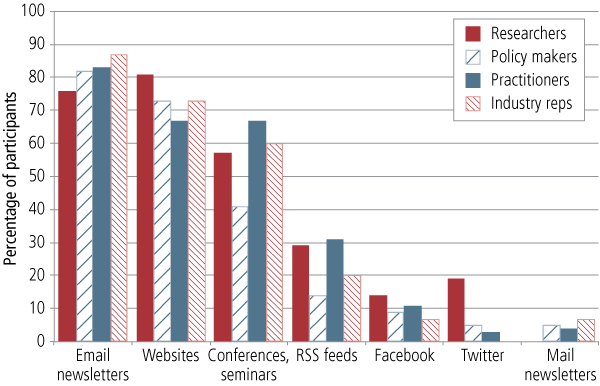
Note: Multiple responses were permitted.
This report was prepared by Sophie Vasiliadis, Dr Anna Thomas and Julie Deblaquiere, all at the Australian Gambling Research Centre, Australian Institute of Family Studies.
978-1-76016-027-2